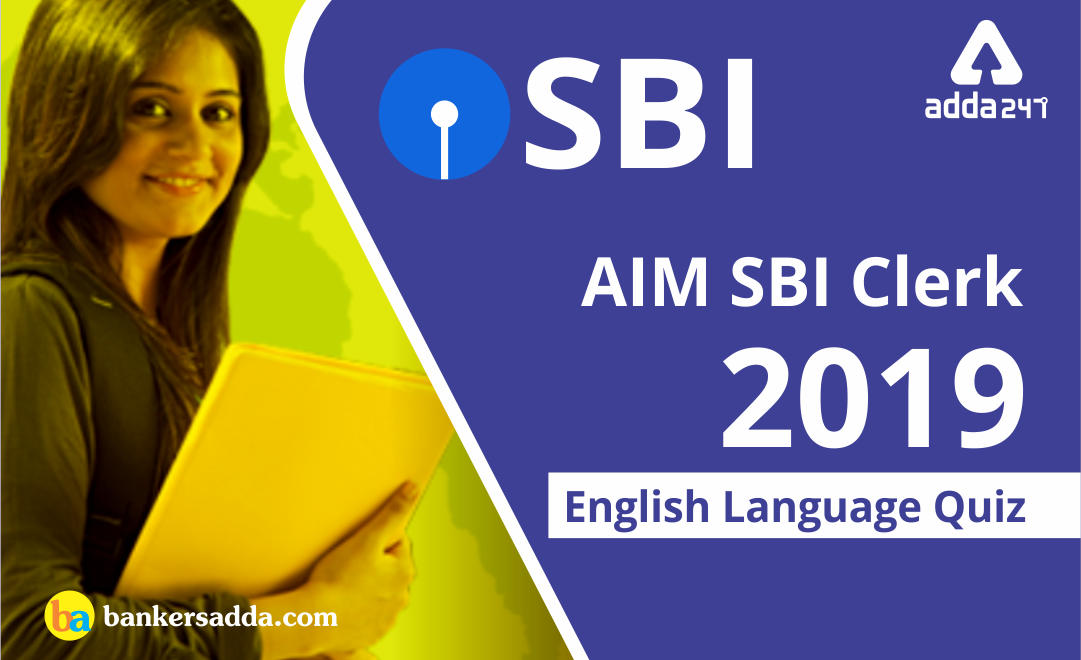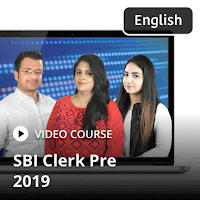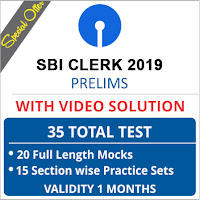SBI Clerk Prelims English Questions
Dear students, The State Bank of India conducts a two-tier examination to recruit Clerks (Junior Associates) at regular intervals. Thus, the English Language plays a crucial role in sailing through all the stages of SBI Clerk exam. Here is a quiz on the English Language to let you practice the latest pattern English Questions for SBI Clerk 2019-20.
Directions (1-5): In each of the questions given below two sentences are given. Both the sentences have a blank which must be filled by the one of the options following the two sentences. The correct choice must fill both the blanks.
Q1.
(I) My genetic makeup is as ___________ as that of my homeland.
(I) My genetic makeup is as ___________ as that of my homeland.
(II) The Increased choices have _____________ the matters for the consumer.
restrained
complicated
asserted
liberated
reserved
Solution:
complicated’ is the correct fit for both the blanks. ‘Complicated’ is used as an adjective in the first sentence, which means ‘complexity’ whereas in sentence (II), it is used as a verb that means
‘confusing’. ‘asserted’ means a state a fact or belief confidently and forcefully. Other options are not making the sentences meaningful.
Q2.
(I) God, acting as a good king and a true father, has given us a will which cannot be ___________, compelled or thwarted.
(I) God, acting as a good king and a true father, has given us a will which cannot be ___________, compelled or thwarted.
(II) __________ public expenditure is required in order to avoid any tax evasion.
dispensed
trained
surged
imposed
restrained
Solution:
. ‘Restrained’ is the best fit here. It can be used as an adjective and a verb. It is used as an adjective in the first sentence while as a verb in the second sentence. As an adjective, it means ‘controlled’ or ‘guarded’ whereas as a verb it means ‘prevent’, ‘impede’ or ‘obstruct’.
Q3.
(I) Mr Charles Green was commissioned to ________ the astronomical observations, and Sir Joseph Banks and Dr Solander were appointed botanists to the expedition.
(I) Mr Charles Green was commissioned to ________ the astronomical observations, and Sir Joseph Banks and Dr Solander were appointed botanists to the expedition.
(II) I am proud to say that I made it completely through school without receiving a censure for my ________________!
impact
progress
conduct
insult
offer
Solution:
‘conduct’ is the correct word to be filled in the blank making the sentence meaningful. Here ‘conduct’ is used both as a noun and as verb. As a noun, it means the manner in which a person behaves, especially in a particular place or situation, while as a verb, it means to lead or guide (someone) to or around a particular place. Hence option (c) is the correct choice. All other options are irrelevant here.
Q4.
(I) Be sure to ______ authorship of the posting to the posting party.
(I) Be sure to ______ authorship of the posting to the posting party.
(II) Not even intelligence can be a/an ________ of the divine Being.
conflict
attribute
grant
impel
visit
Solution:
‘attribute’ is the best suited option for the blank. Attribute means ‘regard something as being caused by’ or ‘allocate’, ‘assign’, when used as a verb while as a noun, it means a quality or feature regarded as a characteristic or inherent part of someone or something. In sentence (I), attribute will be used as a verb while as a noun in sentence (II). Hence option (b) is the correct one.
Q5.
(I) The only reason she could think of was that the man didn't want anyone to ___________ him.
(I) The only reason she could think of was that the man didn't want anyone to ___________ him.
(II) "If you're as smart as I _________, you've probably used your gift to figure out where I am," he said.
suspect
insist
create
defend
refute
Solution:
In sentence (I), ‘suspect’ is used as ‘adjective’ which means not to be relied on or trusted; possibly dangerous or false, ‘suspicious’, ‘doubtful’.
In sentence (II), ‘suspect’ is used as to have an idea or impression of the existence, presence, or truth of (something) without certain proof, ‘feel’, ‘guess’.
Directions (6-10): In each of the questions given below three sentences are given which may or may not be grammatically or contextually correct. Find the sentences which are both grammatically correct and contextually correct and choose the options according to it. If all the given sentences are grammatically and contextually correct then choose option (e) as your choice.
Q6.
(I) Priyamvada was unhappy to hear the news of her son’s failing in the final examination.
(I) Priyamvada was unhappy to hear the news of her son’s failing in the final examination.
(II) Tax evaders should be heavily fined as they are doing it intentionally.
(III) The information supplied to us were not as useful as we first thought it would be.
Only (I) is correct
Only (II) is correct
Both (I) and (II) are correct
Both (II) and (III) are correct
All are correct
Solution:
Sentence (III) is incorrect as the subject of the sentence ‘information’ is uncountable noun and is singular. Hence ‘was’ will be used in place of ‘were’.
Q7.
(I) He asked what the weather had been like during my holidays and I said that it had been awful.
(I) He asked what the weather had been like during my holidays and I said that it had been awful.
(II) Shruti has such a fine memory that she can recollect anything what happened many years ago.
(III) The last of the Mughal emperors of India was imprisoned and was later sent into exile by the British.
Only (I) is correct
Only (II) is correct
Both (I) and (II) are correct
Both (II) and (III) are correct
All are correct
Solution:
Sentence (II) is incorrect. ‘that’ is the correct use instead of ‘what’ as ‘that’ is used in the form of relative pronoun after ‘nothing, anything’.
Sentence (III) is incorrect. ‘on’ will be used after ‘later’ as ‘later’ means ‘afterwards’ whereas ‘later on’ means ‘in the future, or after the time already mentioned’.
Q8.
(I) He is not only sincere in his responsibilities but also very competent to handle the job.
(I) He is not only sincere in his responsibilities but also very competent to handle the job.
(II) One of my brothers told me about the sad demise of your uncle.
(III) As a practice the last batch of the tins undergoes through checkup.
Only (I) is correct
Only (II) is correct
Both (I) and (II) are correct
Both (II) and (III) are correct
All are correct
Solution:
All the given sentences are grammatically correct.
Q9.
(I) The boy who you see there made the top score in the last match.
(I) The boy who you see there made the top score in the last match.
(II) Only by working hard did he prosper as a business consultant since he arrived in America 20 years ago.
(III) In a fit of temper, he tore up the sweet letter which his wife had written to him.
Only (I) is correct
Only (III) is correct
Both (I) and (II) are correct
Both (I) and (III) are correct
All are correct
Solution:
Sentence (I) is incorrect. ‘whom’ will be used in place of ‘who’ as ‘who’ is a nominative case after which a verb is necessary while ‘whom’ is an objective case.
Sentence (II) is incorrect as ‘has he prospered’ is the correct use. If ‘since’ is used in the form of conjunction then main clause is used in the present perfect tense while clause having ‘since’ is used in simple past tense.
Q10.
(I) The teacher drew the attention of the boys to the importance of regular practice.
(I) The teacher drew the attention of the boys to the importance of regular practice.
(II) The teacher said that Ajay was capable of doing more better work.
(III) Did you see any of the child when you were in the garden?
Only (I) is correct
Only (III) is correct
Both (I) and (II) are correct
Both (I) and (III) are correct
All are correct
Solution:
Sentence (II) is incorrect as ‘more better’ is a double comparative which is not used in the sentence. ‘much, very much, far’ is used before comparative degree. Hence ‘much’ or ‘very much’ will be used in place of ‘more’.
Sentence (III) is wrong as ‘children’ is the correct use in place of ‘child’. If countable noun is used after ‘any of, some of, all of’, then it should be plural.
Directions (11-15): In the passage given below there are blanks which can be filled with four of the five options given below without altering the meaning of the statement. Choose the most inappropriate word in each case which does not fit into the provided blank as your answer.
Q11. Coca-Cola India Pvt. Ltd is looking to (11) ___________ Thums Up—the country’s most successful carbonated beverage—in neighbouring countries such as Bangladesh, Sri Lanka, Bhutan and Nepal by the end of March, the company (12) ____________ in Kolkata on Friday. Launched in 1977 by Parle Agro Pvt. Ltd at a time when The Coca-Cola Co. was withdrawing from India, Thums Up quickly became India’s biggest cola brand, (13) ____________ competitors such as Campa Cola and Double Seven. In 1993, The Coca-Cola Co. returned to India and (14) ____________ rights to Thums Up, along with other Parle Agro brands such as Gold Spot and Mazaa, to take on Pepsi. Over the past quarter of a century, (15) ________ from Thums Up has been scaled up to around Rs6,000 crore and it is now poised to become a $1 billion brand, joining other Coca-Cola brands.
launch
release
actualise
impede
introduce
Solution:
Option (d) is the correct choice. The word required here is ‘launch’ or something similar in meaning to make the paragraph coherent whereas; ‘Impede’ as a verb here means to delay or prevent (someone or something) by obstructing them; hinder. Therefore, the correct answer that does not into fit the blank is option (d) i.e. impede.
Q12. Coca-Cola India Pvt. Ltd is looking to (11) ___________ Thums Up—the country’s most successful carbonated beverage—in neighbouring countries such as Bangladesh, Sri Lanka, Bhutan and Nepal by the end of March, the company (12) ____________ in Kolkata on Friday. Launched in 1977 by Parle Agro Pvt. Ltd at a time when The Coca-Cola Co. was withdrawing from India, Thums Up quickly became India’s biggest cola brand, (13) ____________ competitors such as Campa Cola and Double Seven. In 1993, The Coca-Cola Co. returned to India and (14) ____________ rights to Thums Up, along with other Parle Agro brands such as Gold Spot and Mazaa, to take on Pepsi. Over the past quarter of a century, (15) ________ from Thums Up has been scaled up to around Rs6,000 crore and it is now poised to become a $1 billion brand, joining other Coca-Cola brands .
announced
declared
publicized
divulged
obliterated
Solution:
Option (e) is the correct choice that doesn’t fit into the blank. All the other options are making an articulate sentence. The sentence makes a complete sense with the word ‘announced’ as the company is declaring about the launch of “Thums up”. Thus, all the words [except option (d)] similar in meaning with ‘announced’ will satisfy the blank. ‘Divulged’ is a verb which means to make known (private or sensitive information). ‘Obliterated’ is the past tense of the verb ‘obliterate’ which means to destroy utterly; wipe out.
Q13.Coca-Cola India Pvt. Ltd is looking to (11) ___________ Thums Up—the country’s most successful carbonated beverage—in neighbouring countries such as Bangladesh, Sri Lanka, Bhutan and Nepal by the end of March, the company (12) ____________ in Kolkata on Friday. Launched in 1977 by Parle Agro Pvt. Ltd at a time when The Coca-Cola Co. was withdrawing from India, Thums Up quickly became India’s biggest cola brand, (13) ____________ competitors such as Campa Cola and Double Seven. In 1993, The Coca-Cola Co. returned to India and (14) ____________ rights to Thums Up, along with other Parle Agro brands such as Gold Spot and Mazaa, to take on Pepsi. Over the past quarter of a century, (15) ________ from Thums Up has been scaled up to around Rs6,000 crore and it is now poised to become a $1 billion brand, joining other Coca-Cola brands.
trumping
succumbing
beating
clinching
surpassing
Solution:
Option (b) is the correct choice. The most suitable word for the blank is ‘trumping’ which is a verb and is used here as a gerund. It means to surpass (something) by saying or doing something better. ‘Beating’ means to defeat in a competitive situation. ‘Clinching’ means to confirm the winning or achievement of (a match, competition, or victory). ‘Surpassing’ means to be better than others. Hence, the only word left is option (b) ‘Succumbing’ which means to fail to resist pressure, temptation, or some other negative force. Therefore, ‘succumbing’ doesn’t fit into the blank appropriately.
Q14. Coca-Cola India Pvt. Ltd is looking to (11) ___________ Thums Up—the country’s most successful carbonated beverage—in neighbouring countries such as Bangladesh, Sri Lanka, Bhutan and Nepal by the end of March, the company (12) ____________ in Kolkata on Friday. Launched in 1977 by Parle Agro Pvt. Ltd at a time when The Coca-Cola Co. was withdrawing from India, Thums Up quickly became India’s biggest cola brand, (13) ____________ competitors such as Campa Cola and Double Seven. In 1993, The Coca-Cola Co. returned to India and (14) ____________ rights to Thums Up, along with other Parle Agro brands such as Gold Spot and Mazaa, to take on Pepsi. Over the past quarter of a century, (15) ________ from Thums Up has been scaled up to around Rs6,000 crore and it is now poised to become a $1 billion brand, joining other Coca-Cola brands.
blemished
acquired
captured
seized
obtained
Solution:
Option (a) is the correct choice as the word ‘blemished’ does not fit into the blank in a coherent manner. It is a verb which means to spoil the appearance or quality of (something). The paragraph expresses that Coca-cola has acquired the rights of Thums up along with few other companies. Thus, the most suitable word is ‘acquired’. In this paragraph the word acquired is expressing the action of seizing rights by Coca-cola of Thums up. ‘Seizing’ is a verb which means to take hold of suddenly and forcibly. Therefore, option (a) becomes the correct answer.
Q15.Coca-Cola India Pvt. Ltd is looking to (11) ___________ Thums Up—the country’s most successful carbonated beverage—in neighbouring countries such as Bangladesh, Sri Lanka, Bhutan and Nepal by the end of March, the company (12) ____________ in Kolkata on Friday. Launched in 1977 by Parle Agro Pvt. Ltd at a time when The Coca-Cola Co. was withdrawing from India, Thums Up quickly became India’s biggest cola brand, (13) ____________ competitors such as Campa Cola and Double Seven. In 1993, The Coca-Cola Co. returned to India and (14) ____________ rights to Thums Up, along with other Parle Agro brands such as Gold Spot and Mazaa, to take on Pepsi. Over the past quarter of a century, (15) ________ from Thums Up has been scaled up to around Rs6,000 crore and it is now poised to become a $1 billion brand, joining other Coca-Cola brands.
Revenues
Earnings
Profits
Reparations
fruits
Solution:
All the options except option (d) fit into the blank aptly. The most feasible word is ‘revenues’ which is similar in meaning with ‘earnings’, ‘profits’ and ‘fruits’. The word ‘fruits’ is used here as a metaphor which represents the positive result or reward of work or an activity. In this paragraph it means the increased profits earned by the company. ‘Reparations’ means the action of making amends for a wrong one has done, by providing payment or other assistance to those who have been wronged. Thus, it doesn’t fit into the blank aptly.




 English Language Quiz For Bank Foundatio...
English Language Quiz For Bank Foundatio...
 English Language Quiz For SBI Clerk Prel...
English Language Quiz For SBI Clerk Prel...
 English Language Quiz For SBI Clerk Prel...
English Language Quiz For SBI Clerk Prel...



